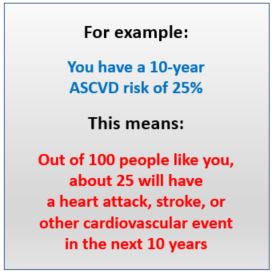Atherosclerotic cardiovascular disease (ASCVD) 10-year risk is the absolute risk estimation of nonfatal heart attack, nonfatal stroke, fatal stroke, and fatal coronary heart disease.1-5 This means it estimates a person’s potential of developing these problems in the next 10 years based on outcomes found from analyzing large amounts of population data of people with similar characteristics and risk factors. A 10-year ASCVD risk score is now recommended for use in making hypertension and high cholesterol treatment decisions.2,4
In creating the 2017 ACC/AHA/AAPA/ABC/ACPM/AGS/APhA/ASH/ASPC/NMA/PCNA Guideline for the Prevention, Detection, Evaluation, and Management of High Blood Pressure in Adults, experts reviewed recent randomized trials, observational studies, and modeling studies. This systematic review of the literature found that lowering systolic blood pressure (BP) to a target of <130 mm Hg may reduce the risk of several major outcomes including risk of heart attack, stroke, heart failure, and major cardiovascular events.6 They determined that lower treatment thresholds and targets will benefit patients who have a higher risk of BP-related complications, such as heart attack, heart failure, and stroke.4,6-8 Therefore, the guidelines endorse antihypertensive medication to lower blood pressure and as a primary prevention of cardiovascular disease for adults with an estimated 10-year ASCVD risk of 10% or higher AND Stage 1 (130/80 mm Hg to <140/90 mm Hg) hypertension.4
Calculating a ASCVD Risk Score
In 2013, the American College of Cardiology (ACC) and American Heart Association (AHA) jointly developed the ASCVD 10-year risk score and calculator (ACC/AHA Pooled Cohort Equations Risk Calculator).3 This risk calculator was based on major cohort studies funded by the US National Heart, Lung, and Blood Institute.
ASCVD risk can be calculated by doctors or an online calculator: ASCVD Risk Estimator Plus.4,5 The online calculator was recently updated to include the Million Hearts Longitudinal Assessment tool, which allows doctors to adjust ASCVD risk score factoring in changes to a person’s risk factors over time. For an initial
ASCVD 10-year risk, only these factors are used in the calculation:3,5
- Age
- Sex
- Race
- Systolic Blood Pressure
- Total Cholesterol
- HDL Cholesterol
- History of Diabetes
- Smoking Status
- On Hypertension Treatment
References
- Karmali KN, Goff DC, Jr., Ning H, Lloyd-Jones DM. A systematic examination of the 2013 ACC/AHA pooled cohort risk assessment tool for atherosclerotic cardiovascular disease. J Am Coll Cardiol 2014; 64 (10): 959-968.
- Stone NJ, Robinson JG, Lichtenstein AH, et al. 2013 ACC/AHA guideline on the treatment of blood cholesterol to reduce atherosclerotic cardiovascular risk in adults: a report of the American College of Cardiology/American Heart Association Task Force on Practice Guidelines. J Am Coll Cardiol 2014; 63 (25 Pt B): 2889-2934.
- Goff DC, Jr., Lloyd-Jones DM, Bennett G, et al. 2013 ACC/AHA guideline on the assessment of cardiovascular risk: a report of the American College of Cardiology/American Heart Association Task Force on Practice Guidelines. Circulation 2014; 129 (25 Suppl 2): S49-73.
- Whelton PK, Carey RM, Aronow WS, et al. 2017 ACC/AHA/AAPA/ABC/ACPM/AGS/APhA/ASH/ASPC/NMA/PCNA guideline for the prevention, detection, evaluation, and management of high blood pressure in adults: executive summary: a report of the American College of Cardiology/American Heart Association Task Force on Clinical Practice Guidelines. Hypertension 2017.
- ASCVD Risk Estimator Plus. American College of Cardiology. Nov 2017; http://tools.acc.org/ASCVD-Risk-Estimator-Plus/#!/calculate/estimate/. Accessed 1/21/2018.
- Reboussin DM, Allen NB, Griswold ME, et al. Systematic review for the 2017 ACC/AHA/AAPA/ABC/ACPM/AGS/APhA/ASH/ASPC/NMA/PCNA guideline for the prevention, detection, evaluation, and management of high blood pressure in adults: a report of the American College of Cardiology/American Heart Association Task Force on Clinical Practice Guidelines. J Am Coll Cardiol 2017.
- Cifu AS, Davis AM. Prevention, detection, evaluation, and management of high blood pressure in adults. JAMA 2017; 318 (21): 2132-2134.
- Wright JT, Jr., Williamson JD, Whelton PK, et al. A randomized trial of intensive versus standard blood-pressure control. N Engl J Med 2015; 373 (22): 2103-2116.


.png)